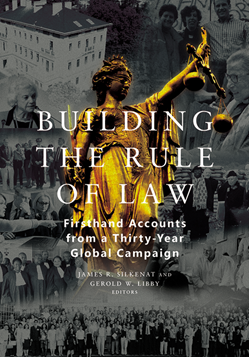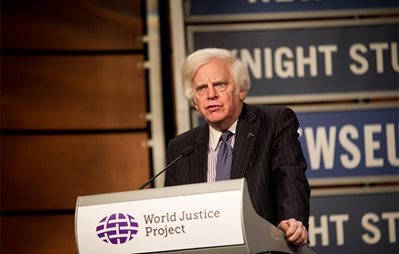Author Chats
James Silkenat Chronicles ABA’s 30-Year Initiative to Advance Rule of Law Around the World
August 09, 2022
In Duly Noted the D.C. Bar continues its author Q&A series featuring members who have published works in a variety of genres.
Building the Rule of Law: Firsthand Accounts From a Thirty-Year Global Campaign reflects on the growth and accomplishments of the American Bar Association’s (ABA) Rule of Law Initiative (ROLI), which evolved out of the Central and Eastern European Law Initiative (CEELI) created shortly after the fall of the Berlin Wall to advance rule of law in former Soviet states emerging from communism.
the Central and Eastern European Law Initiative (CEELI) created shortly after the fall of the Berlin Wall to advance rule of law in former Soviet states emerging from communism.
In the past 30 years, ROLI staff and volunteers have continued to work with lawyers, judges, and bars throughout the world to help develop rule of law in their home countries.
Editors James R. Silkenat and Gerold W. Libby collected the writings of individuals involved in ROLI’s establishment and growth, as well as the personal recollections of volunteers and staff, giving a comprehensive look at how a group of judges and attorneys with a shared belief in the durable and meaningful impact of rule of law set the foundation for work that continues today in a once-again destabilized Eastern Europe and around the world.
As chair of the ABA International Law Section in 1990, Silkenat was involved in early efforts to establish CEELI. Rule of law advocacy continued to factor into his work as ABA president, as chair of the ABA’s Latin American Legal Initiative Council and the ABA China Committee, as chair of the Lawyers Committee for Human Rights (now Human Rights First), and now as World Justice Project treasurer and board of directors member.
Here Silkenat talks about the book and his continuing involvement with the organization.
What is it about rule of law work that grabbed and has held your attention?
I have long had an interest in pro bono legal services. Early in my career, I was chair of the Council of New York Law Associates, a junior bar association in New York that provided free legal assistance to NGOs and nonprofit organizations in the New York area, so that was part of my background. Seeing the principles applied in an international context, which is the practice area in which I worked, was particularly inspiring.
Sandy D’Alemberte was ABA president-elect at the time and an influential figure in law, so when he developed the idea of international pro bono legal assistance for those seeking to develop rule of law abroad, I was keen to help. So, out of my chairman’s budget we funded some initial trips to Eastern Europe to get the process started.
Part of my interest is in helping to protect communities that otherwise wouldn’t have recourse when legal and social problems arise. Part of it has been learning from some of the country’s leading lawyers and judges, with whom I’ve had a chance to work, from Sandy D’Alemberte and Homer Moyer to Justice [Stephen] Breyer and Bill Neukom . . . There have been a number of folks [from whom], just from the direct contact, you absorb the value of these ideas and the importance of making them tangible around the world.
At one point in my career, I had a chance to work for the World Bank Group in a variety of unusual places . . . Pakistan, Zimbabwe, and China. Seeing things on the ground, you feel like you are doing something useful. I feel lucky to have been involved with the ABA’s rule of law work from the beginning.
The rule of law is a concept that impacts everybody, not just judges and lawyers. It affects artists, policemen, doctors, architects, clergy . . . Everybody has a stake in the rule of law, and I think that is becoming more evident day by day.
The term “rule of law” is now used, and misused, in a wide variety of contexts and by a wide variety of commentators. How important is a definition of this term?
commentators. How important is a definition of this term?
The definition of rule of law really does make a difference. It is rule of law, not rule by law as it was previously in South Africa. The four key principles, as developed by the World Justice Project, are accountability, just laws, open government, and accessible and impartial dispute resolution. These principles give some real muscle to the rule of law concept and its implementation around the world.
CEELI and ROLI have drawn support and leadership from a number of prominent judges and attorneys. How did that come about?
Once Justice Sandra Day O’Connor agreed to serve on the [CEELI] board, which she did immediately, it became easier to bring others in. Abner Mikva, who was a [member of] Congress, chief judge of the D.C. Circuit, and counsel to the president; U.S. Department of State counsel Max Kampelman; chief D.C. Circuit judge Pat Wald; and a whole variety of other judges were involved. The book lists the many prominent judicial figures who have been involved with our rule of law work over the years.
CEELI’s efforts were expanded by the ABA through the creation of regional councils, which were eventually consolidated into ROLI. Prior to the consolidation, I chaired the initial Latin American Legal Initiative Council. Justice Breyer came to all the meetings and was eager to participate. [In July] he was appointed the new chair of ROLI. Justice [Ruth Bader] Ginsburg was active in many of the projects, and Justice [Anthony] Kennedy was a member of the Asian affairs council for a number of years and spoke at many of the events.
The involvement of Supreme Court justices and other senior court judges gave us legitimacy, both in the countries where we were operating and domestically. They were instrumental in inspiring attorneys to become involved in our efforts.
What sorts of challenges did you face in organizing and telling ROLI’s story?
One challenge involved the variety of issues to cover. ROLI volunteers have worked on everything from environmental law to taxation, bankruptcy issues, women’s rights, and the establishment of pro bono legal programs. They have helped draft national constitutions.
Another challenge, a good one, was the eagerness of alumni to become involved with the book. We initially planned for a 250-page volume and ended up at twice that length. Even then, we had to make some difficult cuts, despite wanting to include the additional content, just for cost and space reasons.
Why were those personal narratives important to include in the book?
The individual stories of rule of law workers are what make the book so compelling. My co-editor, Gerold Libby, and I reached out to the lawyers and judges who did this work right at the beginning of the project . . . in Poland, China, or elsewhere, and moved forward to more contemporary ROLI staff and volunteers in Latin America and Africa . . . Hearing from them about how the work they did not only changed life on the ground for the citizens, [but also] the lives of the people doing the work. For many of them it was the most energizing thing they had an opportunity to do in their careers.
Some of the stories we tell in the book are surprisingly funny and touch on a wide range of issues. Judge [Judith] Chirlin’s stories about her work in Bulgaria are amusing, and CEELI’s use of a former communist-era ballet school as its headquarters in Prague spring to mind. Other stories are more harrowing, involving physical risks when countries underwent radical change.
The book includes a section on the future of rule of law. Have perspectives changed since publication, given Russia’s military aggression in Ukraine?
I think the principles hold true. We continually experience advances and retreats. The retreats, such as in the situation in Ukraine right now, show how critically important rule of law principles are and how enduring they are.
A number of institutions have been established to work on the same issues as CEELI and ROLI. For example, the ABA also created the World Justice Project, which is now an independent entity that publishes the annual Rule of Law Index, covering more than 130 countries, and sponsors the World Justice Forum, held in the Hague every other year. It is a major player in trying to strengthen rule of law around the world.
Could someone volunteer to work with CEELI today?
CEELI and ROLI have evolved a bit over the years. Initially they were almost entirely volunteer-driven. There was a period in which the organizations expanded their full-time staff in response to requirements by funding sources. Now, we’re trying to move toward a better balance between volunteer work and on-the-ground staff. There are now numerous opportunities for lawyers and judges to participate in ROLI projects, some on the ground abroad, some remotely from the U.S.
Where can readers find your book?
The book is available for purchase in digital and physical formats on the ABA website, or by calling 1-800-285-2221. There is a substantial discount available for ABA members.


